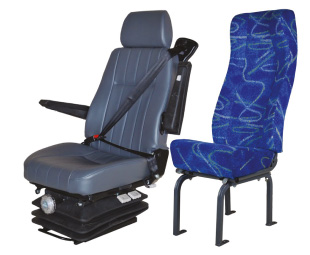Take a seat

Bus seats are sometimes not given the attention they deserve, even though they are vital to the safety and comfort of passengers. CLAIRE RENCKEN speaks to a couple of local bus seat manufacturers about the challenges they face.
Seat manufacturing companies find that operating in the South African market is tough. The new bus market comprises only around 1 500 buses annually, which is very small compared to other African countries. “Furthermore, we are also faced with a growing Chinese presence. The pricing difference between local and imported Chinese products is huge and no South African bus body builder or seat supplier can compete,” explains Peter Wolmarans, director of Seat King.
“We will see more and more buses being imported from China. At present, it is mostly semi-luxury and luxury units, but there’s nothing to stop the Chinese manufacturers from bringing in commuter buses, particularly in light of our government’s weak stance when it comes to the protection of local content. The bus rapid transit (BRT) tenders have proved that ‘local content’ is just a popular phrase, but that no action is taken to drive it and assist local manufacturers to protect themselves,” he adds.
Sadly, Wolmarans has also noticed that some local bus body manufacturers expect unrealistic discounts from seat manufacturing companies. “Local component suppliers are facing serious challenges in terms of profitability. We are looked upon to ‘subsidise’ the ever-increasing prices of buses and bus components, due to the worsening of the rand exchange rate. A prime example is that the seat with which we started our business in 1997 has only now doubled in price. What has happened with the pricing of other components and buses? It could be an interesting exercise to make the comparisons,” he notes.
He goes on to explain that seat manufacturing companies do not have the luxury of part sales to boost profits and must, therefore, make their money on the sale of products. “This has become exceptionally difficult. As a result of the small market and oversupply of manufacturing capacity, the few major seat manufacturers are fighting little price wars to please the original equipment manufacturers (OEMs) and some major corporate operators.
 “All this will just lead to more Chinese products coming into South Africa, more job opportunities lost, and more crime. The time has come for the local OEM market to understand that the local seat manufacturing business is in danger of disappearing, and that they, as huge international conglomerates, need to assist and protect the smaller component manufacturers. As a small South African manufacturing company, we have no alternative but to diversify into other products and focus our efforts in other markets,” he says.
“All this will just lead to more Chinese products coming into South Africa, more job opportunities lost, and more crime. The time has come for the local OEM market to understand that the local seat manufacturing business is in danger of disappearing, and that they, as huge international conglomerates, need to assist and protect the smaller component manufacturers. As a small South African manufacturing company, we have no alternative but to diversify into other products and focus our efforts in other markets,” he says.
Charles Brittz, a director at Ulrich Seats, highlights another challenge facing local bus seat manufacturers: “The cyclical nature of the market, driven mainly by state/provincial and metropolitan planning and funding, dictates a short-term strategy, to minimise the business risk inherent in the uncertain market conditions.”
When asked how the local industry measures up to its international counterparts, Brittz has the following to say: “The majority of seat models manufactured locally are at the lower end of the market, in terms of technologies and styling, compared to Europe. Seats originating from and targeted at the developing markets are technologically equivalent at best, but in our experience are not comparable in respect of durability.
“Invariably the durability requirements demanded by operating conditions are not recognised and catered for. While new seat designs and models have been introduced from time to time, mainly driven by marketing hype and the need for differentiation, the major market requirement has been for cost-effective, practical seating, which can contribute to a cost-effective bus operation for the operator.”
Thankfully, it’s not all doom and gloom. Brittz adds: “Local content requirements for transport products allow us to capitalise on our international technology and supply relationships, by industrialising world-class products suitable for the local market. Our lower cost base and reduced import costs give us a competitive advantage, which has enabled us to operate a sustainable business for 24 years.”
In terms of the actual manufacturing process at Seat King, it is done in-house with the exception of foam, powder coating and trimming materials, such as vinyl and cloth, which are contracted out.
“Computer numerical control (CNC) bending machines are used, as well as a variety of other equipment, to ensure that quality control is maintained. Seat samples are subjected to various tests, which are undertaken on our in-house testing equipment, in order to satisfy management and clients that the products are always manufactured in line with the requirements of the South African Bureau of Standards (SABS),” explains Wolmarans.
“Our major strength is that we continuously develop new products and improve the strength and comfort of existing seats. Our new luxury recliner seat has been well received by major operators as it competes well with the luxury seats in imported coaches. A new concept commuter seat, SK 2020, is gaining more and more market acceptance as the shape changes the historic perception of commuter seats,” he adds.
An exciting new development for Ulrich Seats over the last few years has been the introduction of a locally designed and produced, new-generation city commuter seat for the new BRT/metro bus operations. This seat, targeted specifically at short-distance commuters, has additional moulded foam trim pads for added passenger comfort.
So, what might the future hold for local bus seat manufacturers? Wolmarans concludes: “It is not only the bus seat manufacturers, but the bus manufacturing market as a whole, which will require serious assistance from the government to, among other things, take a serious stand on the protection of local content.”
Published by
Focus on Transport
focusmagsa




